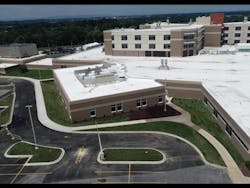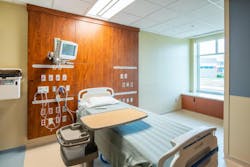A hospital addition in Maryland was designed and built in 120 days
On March 20, Meritus Health Center in Hagerstown, Md., submitted an emergency certificate of need to the state of Maryland’s Healthcare Commission, which one day later approved the hospital’s plan for its permanent 2 South Regional Infection Containment Wing to support COVID-19 infected patients.
Two days after that approval, Gilbane Building Company and Matthei & Colin Associates started assembling a building team to design and build this new facility. (A decade earlier, this same team built the 510,000-sf, 267-bed Meritus Medical Center in what at that time was a record 30 months.)
“Eight days after our initial call, our team was moving soil and digging foundations,” says Gary Orton, vice president and director of healthcare for Gilbane’s Mid-Atlantic division. “A project like this would typically take more than a year to conceptualize, design and build, but we didn’t have that kind of time.”
The steel framing was erected in six weeks and the building was airtight in two months. Streamlining was evident in the reduction of the construction punch list to seven open items, from 73.
The 12,560-sf addition was completed on July 31; the time between the start of designing this wing and its receipt of a temporary certificate of occupancy was only 120 days. The addition was accepting patients by early August.
Also see: A time-lapse video of the hospital wing’s construction
A STREAMLINED PROCESS
As this project proceeded, the first critical steps, according to Matthei & Colin, were defined as: identifying long lead materials/systems and get them ordered as the building was being designed; engaging County and State officials to develop a plan to streamline the permit processes, while ensuring quality and safety of the final product; and developing a schedule with major milestones identified along the critical path.
“We reinvented decision making and certification processes to recognize the realities of working remotely and serving the schedule to bring the facility online as quickly as possible for the community,” says William Heun, lead architect for the project and partner with Matthei & Colin Associates.
According to Gilbane, the fast-track schedule was abetted by bringing the Washington County (Md.) permit and inspections department into daily meetings with the Building Team, to identify areas of improvement and to minimize delays in the permitting and life safety processes.
Gilbane adds that the design-to-permit time for the addition, which normally would take six to nine months for a building this size, was whittled down to less than six weeks.
The team exercised Lean practices to coordinate and streamline processes, expedite permitting, and procurement, design, and construction.
Exterior metal stud wall framing was fabricated on the ground and lifted into place when the structural steel frame was erected. Millwork and casework were assembled in the largest and most complete units possible. Headwalls were prefabricated with all power, gases, outlets and light controls in place, reducing installation time and providing a single point of connection above the ceiling. Door hardware was installed on doors off site, to minimize carpenters’ time in the project area.
Among the project's time-saving measures was prefabricating the patient room headwalls. Image: Gilbane, courtesy of Meritus Health.
ADDITION SUITED TO TREAT ALL INFECTIOUS DISEASES
CM Cost Plus Fee was the delivery method deployed for this $12.5 million addition, which is the first of its kind in the region, with 20 ventilator-capable negative pressure isolation rooms designed and built to contain any type of infectious disease. A sophisticated nurse call system enhances connectivity between patients and the nursing staff. Eight of the wing’s rooms have corridor windows with integrated blinds.
The Building Team included Frederick, Seibert & Associates (CE, land surveying, and landscape architecture), Leach Wallace Associates (MEP engineer), and GRAEF-USA (SE). Other suppliers and subcontractors listed are Heffron, Cindell Construction, Davenport Commercial, Ellsworth Electric, Emmitsburg Glass, Johnson Controls, Kalkreuth Roofing and Sheet Metal, KBK Builders, Kinsley Manufacturing, Modular Services, PAINTech, Ruppert Landscape, Robert W. Sheckles, Siemens, Swisslog Healthcare Solutions, Triad Engineering, and Virginia Sprinkler.

